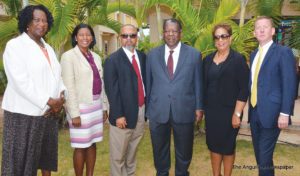
Sir Dennis Byron, Justice Cheryl Mathurin and AG John McKendrick QC
There has perhaps been no other piece of draft legislation in recent times in Anguilla that has been given so much top level attention, as well as public discussion, than the Criminal Justice Bill published by the Attorney General’s Chambers several weeks ago.
The proposed legislation, which was the subject of much local commentary, came into special focus at a one-day conference, on June 22, at La Vue Hotel, dubbed: “Justice Reform: Protecting the Vulnerable”. The conference was headlined by the participation of the Right Hon. Sir Dennis Byron, President of the Caribbean Court of Justice in Trinidad, as the chairperson and a main speaker. Other speakers at the opening ceremony were the Resident High Court Judge in Anguilla, Justice Cheryl Mathurin, who introduced Sir Dennis; the then Acting Chief Minister, Mr. Evans McNiel Rogers; and Minister of Home Affairs, Mrs. Cora Richardson Hodge.
Among the objectives of the conference were to stimulate debate in respect of the passing of the Criminal Justice Bill in the Anguilla House of Assembly; to familiarise delegates with the context and purposes of the legislation; to provide them with a greater understanding of protecting children and vulnerable adults within the criminal justice system; and in particular to explain the use of special measures for witnesses and complainants.
Anguilla’s Attorney General, Mr John McKendrick QC, said in his welcome remarks, among other things, “that it is our duty to protect and recognise those who must be protected or vulnerable in Anguilla.” He gave an insight into the need for the legislation in Anguilla and was grateful to the delegates for coming to the island to share their ideas at the conference.
Acting Chief Minister and Minister of Social Development, Mr. Evan McNiel Rogers, said in part: “The Attorney General’s Chambers has recently drafted the Criminal Justice Reform Bill. We recognised that, to establish a just society, we must ensure that all persons receive a fair deal. Most of all, since we reside in a society where persons are innocent until proven guilty, it is our responsibility to put in place legislation that the innocent are not wrongly punished. And for those who are convicted, that the system works effectively where possible to allow for their re-entry into the community of rehabilitated persons. We are also putting into place the reinforcement of measures for the safety of citizens and the requirement for seat belts. All these reform measure have come about by listening to the community and addressing their concerns through the legislative process.
“The Criminal Justice Reform Bill seeks to protect the children and the vulnerable; criminalise child pornography as well as the sharing of indecent imagery… It also legislates for evidential and procedural changes to permit children and vulnerable witnesses to give evidence in court more easily; and it decriminalises small amounts of cannabis for recreational use. This cannabis issue is only a small part of the Bill. However, it has attracted a lot of attention. It must therefore be pointed out that the Government’s official position remains – that is cannabis is harmful and illegal. However, a person found with less than 10 grams of cannabis will not be charged with a criminal offence. The view is that far too many young men have their lives blighted by criminal cannabis possession which may lead them into a life of crime; may impede their job prospects and hinder overseas travel. This measure seems to be the most viable solution given the fact that cannabis consumption remains a live issue despite many years of effective law.
“In addition to the Criminal Justice Reform Bill, we have also drafted new child protection measures. Anguilla, like many countries across the Caribbean, has stepped up their efforts to improve safe responses to child protection – both children who are at risk as well as those who come in conflict with the law.”
Minister Cora Richardson-Hodge said it was an opportune time for the holding of the conference. She was grateful to the Attorney General of Anguilla, along with his team and the Ministry of Social Development, for organising the conference.
She believed that there was a general recognition that the island’s existing justice system does not adequately provide the best protection for vulnerable witnesses, including abused children and women in abusive relationships, appearing in court. She said human trafficking and mentally ill persons, and other matters, were all issues being grappled with in Anguilla. She stressed that there was a need to ensure that the island had fit to purpose legislation, and that there were in place appropriate court structures to resolve family disputes, protect children and to provide protection for the vulnerable.
Sir Dennis Byron said the international conventions and obligations relating to the rights and protection of the child, and other commitments, were consistent with the underlying values expressed in the Anguilla Constitution. He noted that over the years there was quite a lot of domestic legislation in Anguilla relevant to the rights and wellbeing of children.
He pointed out that the Criminal Justice Reform Bill had addressed a number of other important issues relating to vulnerable persons in Anguilla, as well as to help them to give careful and thoughtful evidence in court. He spoke at length about other provisions of the Bill adding that the day’s proceedings “presented a pretty good platform for social education in Anguilla.”
The one-day conference sessions involved presentations by a number of visiting delegates from the Foreign and Commonwealth Office and the English Family Law Bar Association in London, the Grand Court in the Cayman Islands and the Anguilla Bar Association.
The Criminal Justice Bill has been published on the Anguilla Government’s website for public information and comment pending its presentation in the House of Assembly for passage on a date to be fixed and announced.







